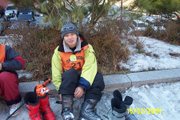I copied this article I found on the net for all you guys who might wanna know this stuff.
From:
Press & Sun-Bulletin
January 28, 2007
By Elizabeth Cohen
(http://www.etni.org.il/news/newest_slang.htm)
'Sup, dawg? Wanna kick it at my crib?
If you can answer those questions, or if you know what's "poppin'" or "snappin'" or find yourself frequently uttering "word up," chances are, you are a teenager or have recently been one. And chances are, you likely know a lot of other words that, for the most part, only other teenagers know.
In fact, there is a mammoth lexicon of words and phrases, growing furiously all the time, to express all things teen. Much of it, say those in the know, comes straight from hip hop and rap music, music videos and the Internet, where places like MySpace.com serve as verbal crockpots teens spoon into, every time they open their mouths.
"Language is always changing," said Deborah Tannen, renowned linguist and author of "Conversational Style: Analyzing Talk among Friends" and other books about how people communicate. "It's never static, and new forms always sound odd or wrong before they start sounding normal."
But to the kids, it sounds just right. They seem to thrive on having their own codes and words for things that adults don't always understand.
"It is like people used to say 'mad nice,' and they still do sometimes to say 'very nice,'" explained Clifford Harris, 13, of Binghamton. "Well, today they might say 'dirt nice,' or 'stupid dirt nice' or just 'that's tight.'"
Interestingly, many of these words -- modifiers like "dirt" and "mad" (which mean "very") -- flip their semantics over, from negative to positive, in teenspeak today.
"We say something is 'sick' and it means we like it a lot," said Harris. "Like, you could have some sick jeans."
ADULTS DIAL IN
Out of pure necessity, parents and teachers who traffic in the day-to-day teen world learn to understand a few of the words the teens in their lives use frequently. They may even find themselves repeating them after a time, saying something is "wicked fun," for example, to entice kids to join in an activity.
"It is important to keep up with what we hear in the hallways," said Roxie Oberg, an English teacher at Binghamton High School. "Every year some new popular words are added to the vocabulary. Usually it is something adopted from the larger culture, that is media-oriented and promoted."
Without knowledge of these words, "it can be easy to jump to conclusions," Oberg said. "Sometimes I will ask for clarification, arch an eyebrow or give them an inquisitive look, and they will redefine or restate what they are saying, which is also a good language skill."
This school year, a group of teachers at Binghamton High School thought that understanding new phrases and words was so important to their teaching abilities that they came up with an interesting solution. They conducted a survey by interviewing the ninth-grade students during lunch and created a PowerPoint presentation of a "dictionary" they called "Freshman Terminology," which they screened and disseminated to their fellow ninth-grade teachers.
"The generation we teach has a very broad vocabulary," stated the introduction to the freshman terminology dictionary that lists such words as "boo" (close friend, boy- or girlfriend); "G" (acquaintance) and "hot whip" (nice car). Some more standard fare, like "my bad" (my mistake) and the phrase "snitches get stitches' ("telling on a third party can result in massive head wounds...") are also on their annual list.
Another whole facet of teen lingo is imported all the time from teen computers. Daquan Floyd, 13, of Binghamton can list a host of other spoken words that originated as abbreviations on the Internet, among them "LOL," which stands for "laughing out loud"; "OMG," an abbreviation for "Oh, my God"; and "BRB," shorthand for "be right back."
Although these were originally only written out, now saying the letters of these and many more, or making words out of them, is commonplace. "I could say the letters "ttyl" and it would mean "talk to you later," says Kayla Cummings, 14, of Binghamton.
LANGUAGE IN FLUX
All age groups have their own slang, of course. Some experts even argue that this is a natural process and one of the most important ways that language grows.
"Young people -- especially young women-- are often at the cutting edge of change, probably because they're more flexible," Tannen said. "And groups ... tend to develop their own ways of talking in group vocabulary."
Hip teen speak has been around as long as language, helping to define each generational group as distinct and unique. Remember "peachy keen" of the 1950s? Or the ubiquitous "chill out" and "chilling out" (for calm down or relax) of the 1970s and '80s?
"When I was a teenager, we said things were 'crack' to say they were not so good, as in, 'that's crack,'" said Donna Ward, Binghamton mother of teen Floyd, and two preteen children who are fast picking up on teenspeak themselves.
"We'd say, 'Chill boy!,' and talk about how much we were stressing out," said Ward, who also works in a school. She can relate to the words that come to mean their opposites. "We'd say 'hot' to mean 'cool,'" she recalled. "Kids will always have a language of their own that their parents will be hard put to understand. Our parents had theirs, too. When we were kids, we would say nice things were 'dope,' and it would make them so mad."
Tannen agrees: "One reason kids talk the way they do is that their friends talk that way," she said.
DECIPHERING THE 'CODE'
Developing a lingo, Ward believes, "is healthy -- it is teens' way of showing their individuality and of making themselves heard."
Many adults, like the Binghamton High School faculty, do keep up with the ever-changing vernacular of young people so they can be aware of what's happening with them (and to assure themselves that the little darlings aren't "dawging" them.) Participating in the teen world can give one a chance to learn their lingo, so you don't feel left out in the cold every time they speak. "Working at a school gives me an opportunity to keep up," Ward says.
English teacher Oberg said there are times when she tells her students she needs a quick translation: "I ask them to interpret for me, define their terms, clue me in on what is going on."
That is how she and the other school teachers learned that a "shorty" is an attractive female, that a "scrap" is a confrontation and that "bling-bling" is expensive jewelry.
It is OK for students to use some of these words in school homework or their English essays, Oberg said. But it's not OK for others that may verge on obscenity or be overly suggestive, like hanging, banging or hooking up, which can all mean having sex. And it is good for them to know another way to say things, too, in more traditional speech.
"It is good for them to have their identity through their own terms, but we need to help them also make the transition to formal language that gives them access to the rest of the world," Oberg said. "We would do our students a disservice if we didn't help them negotiate the world at all levels."
She gains insight into the culture and issues in the lives of students by listening to their lingo, and she also likes to encourage them to examine how they use language and its impact.
Language, Oberg said, "helps us understand people and places; it is a window to another world."
So if you're asking your teen a question around her friends today, and she tells you "snap" (yes) or "snare" (no), or that's she's "stoked" (excited), you can always just respond: "Word up. That's phat." (Translation: Exclamation of affirmation, followed with a pronunciation of "fat," which means fine or cool.)
If she goes into some Internet acrynoms -- "IDK" (I don't know), "w/e" (whatever) or "CYL" (see ya later) -- you might have to think a little harder.
"When it comes to all these computer words, I am still trying to catch up, but most of the time, I understand them," Ward said. "Really, really, I do."

























